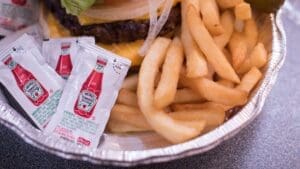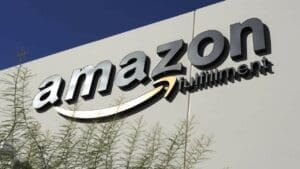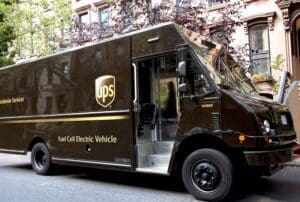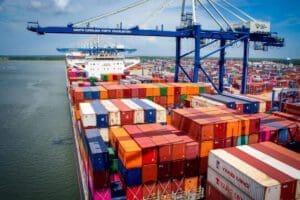 Over the last year, we have seen shortages of almost everything you can imagine. The most famous shortage, of course, was the toilet paper shortage, which was really more about a shift in usage and panic buying than production. We have also seen shortages of semiconductor chips, shipping containers, and even test monkeys (seriously). And now we may be facing a new shortage: ketchup. According to a recent report from the Wall Street Journal, we can blame Covid and curbside pick-up for the shortage. Ever since the pandemic hit last year people have been turning to curb-side pickup and food delivery services in record numbers and as a result, there has been a greater demand for ketchup packets instead of, say, ketchup bottles restaurants would have sitting on diners’ tables. But that extra demand for packet-based ketchup has now led to a shortage. While some restaurants are using ketchup bottles to fill plastic containers, others are simply not giving ketchup to customers. This will certainly be an interesting story to watch unfold, especially for those of us who love ketchup. And now on to this week’s logistics news.
Over the last year, we have seen shortages of almost everything you can imagine. The most famous shortage, of course, was the toilet paper shortage, which was really more about a shift in usage and panic buying than production. We have also seen shortages of semiconductor chips, shipping containers, and even test monkeys (seriously). And now we may be facing a new shortage: ketchup. According to a recent report from the Wall Street Journal, we can blame Covid and curbside pick-up for the shortage. Ever since the pandemic hit last year people have been turning to curb-side pickup and food delivery services in record numbers and as a result, there has been a greater demand for ketchup packets instead of, say, ketchup bottles restaurants would have sitting on diners’ tables. But that extra demand for packet-based ketchup has now led to a shortage. While some restaurants are using ketchup bottles to fill plastic containers, others are simply not giving ketchup to customers. This will certainly be an interesting story to watch unfold, especially for those of us who love ketchup. And now on to this week’s logistics news.
- Amazon is turning malls into distribution centers
- UPS partially reinstates money-back delivery guarantee
- FourKites acquires Haven and introduces Dynamic Ocean
- Covid and underserved communities in the news:
- Startups are trying to make e-commerce packaging more sustainable
- US trade deficit jumps 4.8 percent to $71.1 billion in February
- South Carolina Ports breaks all-time container record
 Before the Covid pandemic hit, brick and mortar retailers were already feeling the pressure of e-commerce. Over the last year, e-commerce growth has surged as consumers stayed away from stores and malls, even when they were allowed to re-open. That begs the question – what is going to happen to empty storefronts and America’s malls? Over the last several months, Amazon has gone on a shopping spree, buying up disused malls across the country and turning them into distribution centers. Between 2016 and 2019, Amazon converted around 25 shopping malls into distribution centers. And just last year, it was reportedly in talks with Simon Property Group to convert bankrupt JCPenney and Sears department stores into fulfillment centers. While Amazon has been quiet when approached about these acquisitions, it should be noted that the company is continuing with its plan to develop delivery stations to blanket the suburbs, something malls would be the perfect location for.
Before the Covid pandemic hit, brick and mortar retailers were already feeling the pressure of e-commerce. Over the last year, e-commerce growth has surged as consumers stayed away from stores and malls, even when they were allowed to re-open. That begs the question – what is going to happen to empty storefronts and America’s malls? Over the last several months, Amazon has gone on a shopping spree, buying up disused malls across the country and turning them into distribution centers. Between 2016 and 2019, Amazon converted around 25 shopping malls into distribution centers. And just last year, it was reportedly in talks with Simon Property Group to convert bankrupt JCPenney and Sears department stores into fulfillment centers. While Amazon has been quiet when approached about these acquisitions, it should be noted that the company is continuing with its plan to develop delivery stations to blanket the suburbs, something malls would be the perfect location for.
 UPS has reinstated money-back delivery guarantees on packages moving under its three next-day air delivery products. However, UPS said it has loosened the deadlines on its next-afternoon air deliveries to make it easier to meet its service commitments without being penalized. The policy change, which took effect Monday, will apply to UPS’ Early A.M. air delivery product, which promises deliveries by 8 the next morning; its next-day air product, which guarantees deliveries by 10:30 a.m.; as well as the next-afternoon delivery product, known as Saver. In addition, UPS has reinstated money-back guarantees on a slew of international express delivery products. It has not restored money-back guarantees on any of its other product lines. UPS suspended its money-back guarantees in March 2020, citing unprecedented market conditions due to the COVID-19 pandemic. Rival FedEx, which also suspended its service guarantees at the time, has not reinstated its program.
UPS has reinstated money-back delivery guarantees on packages moving under its three next-day air delivery products. However, UPS said it has loosened the deadlines on its next-afternoon air deliveries to make it easier to meet its service commitments without being penalized. The policy change, which took effect Monday, will apply to UPS’ Early A.M. air delivery product, which promises deliveries by 8 the next morning; its next-day air product, which guarantees deliveries by 10:30 a.m.; as well as the next-afternoon delivery product, known as Saver. In addition, UPS has reinstated money-back guarantees on a slew of international express delivery products. It has not restored money-back guarantees on any of its other product lines. UPS suspended its money-back guarantees in March 2020, citing unprecedented market conditions due to the COVID-19 pandemic. Rival FedEx, which also suspended its service guarantees at the time, has not reinstated its program.
 FourKites, a market leader in real-time supply chain visibility, announced its acquisition of Haven, Inc., and the introduction of Dynamic OceanSM, a next-generation visibility solution that redefines end-to-end management for international ocean shipments. The solution integrates advanced document management capabilities, robust collaboration features and support for bookings, with superior end-to-end real-time tracking. Benefits of Dynamic Ocean include expedited flow of goods through busy ports; significantly reducing detention and demurrage costs; and improved customer satisfaction. Dynamic Ocean covers 99% of global container traffic and more than 750 ports.
FourKites, a market leader in real-time supply chain visibility, announced its acquisition of Haven, Inc., and the introduction of Dynamic OceanSM, a next-generation visibility solution that redefines end-to-end management for international ocean shipments. The solution integrates advanced document management capabilities, robust collaboration features and support for bookings, with superior end-to-end real-time tracking. Benefits of Dynamic Ocean include expedited flow of goods through busy ports; significantly reducing detention and demurrage costs; and improved customer satisfaction. Dynamic Ocean covers 99% of global container traffic and more than 750 ports.
 With eligibility requirements easing and vaccine supplies growing, Walmart is now administering vaccines in more than 3,800 stores and clubs across 48 states, Puerto Rico, and Washington, DC. The company is also placing more emphasis on rural and vulnerable areas across the country. According to Dr. Cheryl Pegus, executive vice president, health & wellness at Walmart, more than 80 percent of shots administered through pharmacies and 60+ dedicated community events were in what HRSA designates as the most medically underserved areas of the country.
With eligibility requirements easing and vaccine supplies growing, Walmart is now administering vaccines in more than 3,800 stores and clubs across 48 states, Puerto Rico, and Washington, DC. The company is also placing more emphasis on rural and vulnerable areas across the country. According to Dr. Cheryl Pegus, executive vice president, health & wellness at Walmart, more than 80 percent of shots administered through pharmacies and 60+ dedicated community events were in what HRSA designates as the most medically underserved areas of the country.
“For example, in Jackson, Mississippi, we partnered with the Jackson Housing Authority to set up in a community center for a low-income senior housing unit where we administered nearly 2,000 vaccinations to vulnerable seniors.”
 Target is also looking at underserved communities when it comes to Covid vaccine distribution. The company has earmarked $5 million to support global, national, and local efforts to help boost community access to COVID-19 vaccinations. To start, Target is contributing $1 million to nonprofits offering access to free and discounted rides to coronavirus vaccine appointments via the Lyft Universal Vaccine Access campaign. Under the program, the rideshare company and a coalition of partners provide underserved communities access to rides to and from immunization sites. Target noted that the donation, expected to fund tens of thousands of rides, expands its existing partnership with Lyft to provide all US-based Target employees with free roundtrip Lyft rides to vaccine appointments, up to $15 each way.
Target is also looking at underserved communities when it comes to Covid vaccine distribution. The company has earmarked $5 million to support global, national, and local efforts to help boost community access to COVID-19 vaccinations. To start, Target is contributing $1 million to nonprofits offering access to free and discounted rides to coronavirus vaccine appointments via the Lyft Universal Vaccine Access campaign. Under the program, the rideshare company and a coalition of partners provide underserved communities access to rides to and from immunization sites. Target noted that the donation, expected to fund tens of thousands of rides, expands its existing partnership with Lyft to provide all US-based Target employees with free roundtrip Lyft rides to vaccine appointments, up to $15 each way.
As sustainability efforts continue to grow, companies are looking at ways to be innovative with the rise of e-commerce. By the end of 2020, an estimated three billion boxes were delivered during the holiday season alone. In fact, even cardboard makers have been adjusting production to meet demand and avoid a shortage of packaging materials. Now, startups are popping up trying to offer more sustainable solutions to one-off cardboard boxes. While more environmentally friendly packaging is increasing in popularity, a shift to reusable packaging is taking shape. One newcomer tackling the problem is Boox, which makes foldable boxes that customers can either reuse or send back to the brand for repurposing. The company recently launched via a pilot run with Ren Skincare, and is in the process to expand to other retail partners.
The US trade deficit grew to a record $71.1 billion in February as a decline in exports more than offset a slight dip in imports, with severe weather taking much of the blame from analysts, who were expecting a slightly lower gap. The February gap between what America buys from abroad compared to what it sells abroad jumped 4.8 percent above the revised January deficit of $67.8 billion, the Commerce Department said Wednesday. The higher trade deficit in February reflected a 2.6 percent decline in exports of goods and services to $187.3 billion on a seasonally adjusted basis. That wiped out a 0.7 percent decline in imports, which ticked down from January’s record high of $260.1 billion.
 Speaking of record high imports, the West Coast ports have been getting all the attention. However, the East Coast is setting records too. South Carolina Ports turned in its best cargo-handling performance in history in March, and the volume was 34 percent higher year-over-year. In its all-time container record, the SCPA moved 248,796 TEUs across the Port of Charleston’s Wando Welch and North Charleston container terminals in March. The previous record was set in August 2019 with 233,110 TEUs. In March 2020, as the supply chain stoppage brought on by the COVID-19 pandemic was felt at U.S. ports, the SCPA handled a total of 185,631 TEUs.
Speaking of record high imports, the West Coast ports have been getting all the attention. However, the East Coast is setting records too. South Carolina Ports turned in its best cargo-handling performance in history in March, and the volume was 34 percent higher year-over-year. In its all-time container record, the SCPA moved 248,796 TEUs across the Port of Charleston’s Wando Welch and North Charleston container terminals in March. The previous record was set in August 2019 with 233,110 TEUs. In March 2020, as the supply chain stoppage brought on by the COVID-19 pandemic was felt at U.S. ports, the SCPA handled a total of 185,631 TEUs.
That’s all for this week. Enjoy the weekend and the song of the week, Las Ketchup (the Ketchup Song) by Asereje.
















